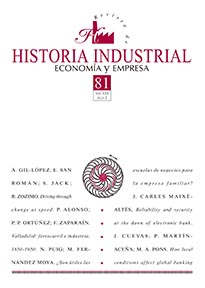Reliability and security at the dawn of electronic bank transfers in the 1970s-1980s.
DOI:
https://doi.org/10.1344/rhi.v30i81.31405Paraules clau:
computer security and reliability, banks and savings banks, teleprocessing networks, electronic funds transfersResum
From a historical perspective, the concept of reliability and computing security at the beginning of the 1970s, when electronic data transfer processes were in their early stages, allows us to observe a paradigm shift regarding these issues in banking. Hardware and software, considered computer assets, became more relevant as opposed to the traditional concept of security, in relation to money deposited or the identification of customers in a bank office. It is interesting to consider this changing culture in the cases of Japan, Spain and Germany, in terms of their national banking networks, together with the role of the new banking standards in these processes. They offer an interesting field of analysis, in which concerns about the reliability of computing processes join digital security as key factors in a new conceptualization of financial activity, within the framework of asset dematerialization that has affected the banking business in recent decades.
Descàrregues
Descàrregues
Publicades
Com citar
Número
Secció
Llicència
The author assigns all rights to the publisher. Creative Commons
The author who publishes in this journal agrees to the following terms:
- The author assigns all intellectual property rights exclusively to the publisher for the entire duration of the applicable intellectual property rights.
- The publisher will distribute the texts under the Creative Commons Attribution License, which allows others to share the work, provided that they acknowledge the authorship, its initial publication in this journal, and the conditions of the license.





